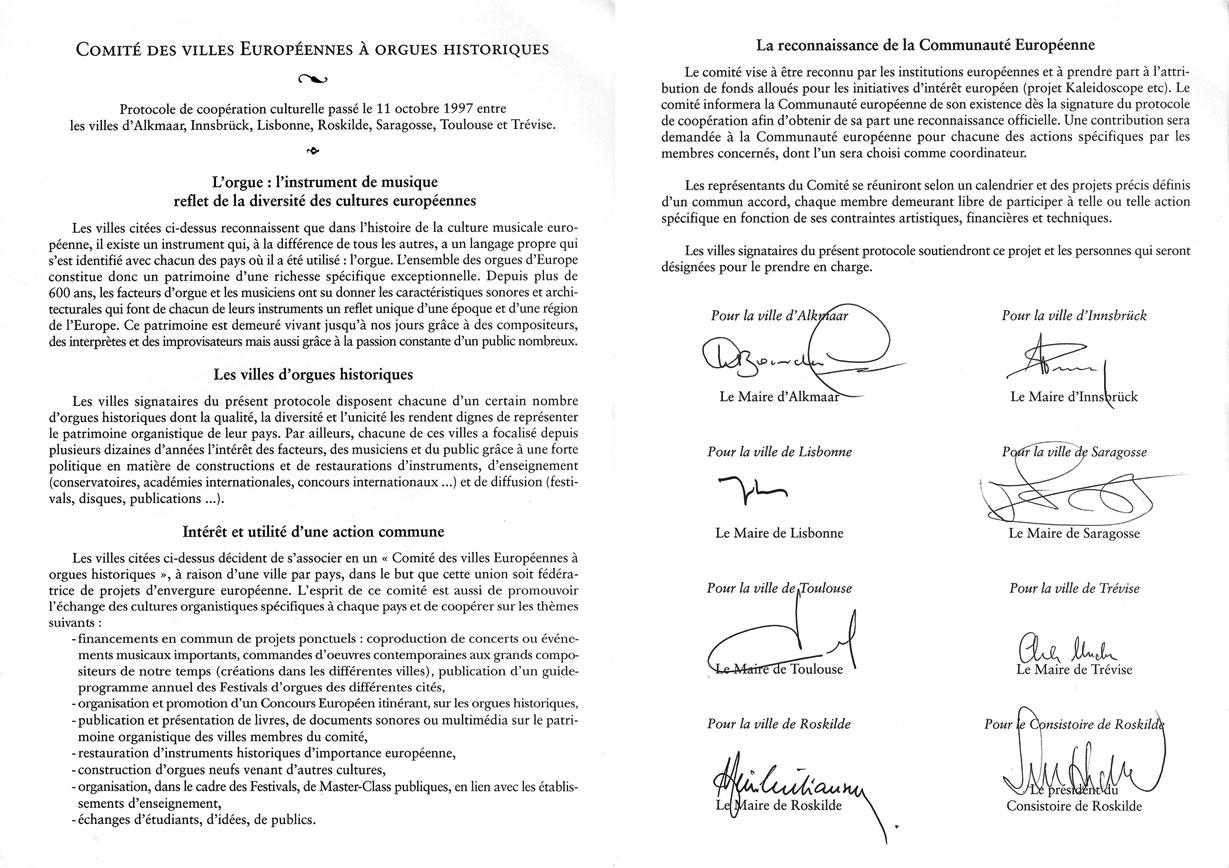ECHO (EUROPEAN CITIES OF HISTORICAL ORGANS / EUROPAE CIVITATES HISTORICORUM ORGANORUM) was founded in 1997 upon a proposal made by Andrea Marcon, by the cities of ALKMAAR (Netherlands), INNSBRUCK (Austria), LISBON (Portugal), ROSKILDE (Denmark), TREVISO (Italy), TOULOUSE (France) and ZARAGOZA (Spain).
This union of cities both with historical organs and a festival or an international competition then decided to unite their efforts, share documentation on historical instruments, make common projects and exchanges, help students exchanges, and promote the construction of new instruments based on historical examples.
As a rule (but this recently was modified) only one city per European country may be elected member of ECHO. The INGO is governed by a board (one representative of each city administration) and the artistic directors meeting (one AD per city), which meets twice a year.
The purpose of the organization is to play a unifying role in the cultural inheritance and projects on a European scale regarding ORGANS OF HISTORIC VALUE and of European origin.
In connection with the main purpose, the organization shall generally foster cultural exchange and good relations between primarily European countries in possession of important historical organs, especially in the following fields:
- publishing and promoting books, audio and multimedia material on the organs of historical value of the member cities,
- maintenance, restoration, preservation and conservation of important historical organs,
- education, organizing of master-classes open to a public, ideas and audiences,
- organizing exchange of students in the different ECHO cities and schools of music,
- organizing and promoting a rotating European competition in music played on historical instruments,
- initiating support and performing fund-raising activities (special for restoration and publishing books).
THE ECHO-PROTOCOL - english translation
COMMITTEE OF EUROPEAN CITIES AND TOWNS WITH ORGANS OF HISTORIC VALUE
Protocol on cultural cooperation
signed on 11th October 1997 by the cities and towns of Alkmaar, Innsbruck, Lisbon, Roskilde, Zaragoza, Toulouse and Treviso
The organ : a musical instrument that reflects Europe's cultural diversity
The cities and tows listed above agree that in this history of European music, one instrument has, more than any other, played a unique role in every country in which it has been used : the organ. All of Europe's organ together thus constitute an extraordinary heritage for more than 600 years, organ builders and musicians have build their instruments with design and acoustical qualities that have turn each one into a unique representative of a specific era and region of Europe. This remarkable heritage has been preserved until now by composers and musicians, as well as the continued interest of a large audience.
Cities and towns with organs of historic value
The signatories to the present protocol each have a number of historic organs, the quality, diversity, and uniqueness of which make them deserving representatives of their countries musical heritage. These cities and towns have, in addition attracted the attention of organ builders, musicians and the public for several decades through their efforts in the areas of organ building and restoration, teaching (conservatories, international academies, international competition ...), and promotion (festivals, albums, books, …).
The need for joint action
These cities and towns listed above have decided to form the committee of « European cities and towns with organs of historic value », consisting of one city or town per country. The aim of this organisation is to play a unifying role in projects on a European scale. It also aims to promote cultural exchanges on issues specific to each country, and to co-operate along the following lines :
- joints financing of selected projects : co-producing concerts and major musical events, commissioning great modern composers to write contemporary pieces (created in the various cities and towns), publishing an annual guide to organ festivals in various cities.
- organising and promoting a travelling European competition on historic organs,
- publishing and promoting books, audio and multimedia material on the organs of historic value of the member cities and tows,
- restoring organs with historic value in Europe,
- building new organs based on organs based on designs from other cultures,
- organising master-classes open to a public, as part of festivals in conjunction with teaching establishments,
- exchanging students, ideas and audiences.
European Community recognition
The committee intends to obtain a recognition from the European authorities in order to qualify for available funding for European programs (the Kaleidoscop project...). The committee will inform for the European Community of its existence following the signature of the protocol in order to receive official recognition. A contribution from the European Community will be requested for each event organised by member countries. One member will be chosen to act as co-ordinator.
The committees representatives will meet according to an agreed time-table for specific projects. Each member will be free to choose whether to participate in a specific project, based on artistic, financial and/or technical constraints.
